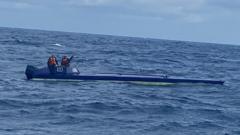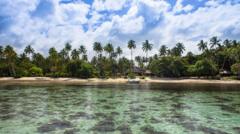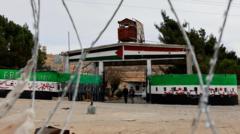Colombian security forces have discovered a new cocaine smuggling route targeting Australia after intercepting semi-submersible vessels in the Pacific Ocean. This operation highlights the increasing links between South American drug trafficking networks and Australian consumers, who pay significantly higher prices for the narcotic.
Colombian Navy Uncovers New Cocaine Smuggling Route to Australia

Colombian Navy Uncovers New Cocaine Smuggling Route to Australia
The Colombian Navy intercepts a semi-submersible carrying cocaine, revealing a new direct maritime trade route to Australia, where the illicit drug market is booming.
The Colombian navy recently intercepted a semi-submersible vessel transporting a significant cargo of cocaine in the Pacific Ocean, signaling a potential new route for drug traffickers targeting Australia. Historically, these homemade vessels have been used for transporting narcotics to Europe, but the discovery indicates they are now capable of reaching Australian shores.
Authorities revealed that this vessel was equipped with sufficient fuel to embark on a journey toward Australia and that route maps indicated it was likely its intended destination. The Colombian navy emphasized the extreme profitability of cocaine smuggling to Australia, where a kilogram of the drug can command prices as high as $240,000, six times greater than in the United States.
This interception marks the third semi-submersible vessel halted in the Pacific Ocean by Colombian officials, suggesting that drug trafficking organizations may have established a new direct maritime route to Australia. The latest narco-sub was intercepted approximately 1,200 miles southwest of Clipperton Island, a remote and uninhabited atoll in the Pacific, and is believed to have originated from the Colombian port of Tumaco.
Colombian Vice-Admiral Orlando Enrique Grisales, chief of naval operations, provided insights into the navy's operations, stating that all three seized semi-submersibles could sail from Colombia to Australia without needing to refuel at sea. The discovery of navigation maps on the first vessel led to closer cooperation with Australian authorities, facilitating a coordinated response to the threat.
The recent interceptions are part of "Operation Orion," a multinational naval initiative that has resulted in the seizure of around 225 tonnes of cocaine over the span of six weeks and the arrest of over 400 individuals across various nations. Vice-Admiral Grisales noted the operation uncovered strong ties between drug trafficking syndicates in South America and their counterparts in Oceania, describing the networks as structured organized crime groups collaborating on a global scale.
Colombian President Gustavo Petro praised the navy for their effective enforcement efforts, emphasizing the impact of such operations on transnational drug trafficking. With growing concerns about cocaine consumption levels in Australia, which ranks highest in the world for cocaine usage per capita, these findings underscore the ongoing challenges faced by authorities in combating the illegal drug trade.



















